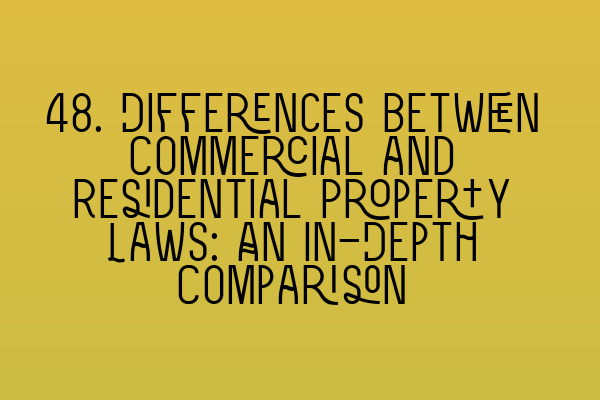In the world of property law, there are two main categories: commercial and residential properties. While both types fall under the umbrella of property law, they have distinct differences in terms of regulations, rights, and obligations. Whether you are a landlord, tenant, or property investor, it is important to understand these differences in order to navigate the legal landscape effectively. In this article, we will provide an in-depth comparison of commercial and residential property laws.
1. Definition and Purpose:
Commercial properties refer to buildings or land that are used for business or profit-making purposes. This includes office buildings, retail spaces, warehouses, and industrial properties. On the other hand, residential properties are primarily used for living purposes and include houses, apartments, condominiums, and townhouses. The purpose of commercial properties is to generate income, while the purpose of residential properties is to provide a place of residence.
2. Legal Framework:
Commercial property laws are usually governed by contract law and property law, with an emphasis on commercial leases. These leases are typically longer and more complex compared to residential leases, as they involve negotiations on rent, lease terms, and additional provisions such as maintenance responsibilities and tenant improvements. Residential property laws, on the other hand, are primarily governed by landlord-tenant legislation, which aims to protect the rights and interests of both landlords and tenants.
3. Lease Agreements:
Commercial lease agreements are typically longer and more detailed compared to residential leases. They often include provisions for rent adjustments, rent reviews, tenant improvements, and responsibilities for maintenance and repairs. Commercial leases also tend to have longer notice periods and more flexible termination clauses. On the other hand, residential leases are usually shorter in duration and have standardized terms and conditions as mandated by local landlord-tenant laws.
4. Rent:
In commercial properties, rent is usually higher compared to residential properties due to the income-generating nature of businesses. Commercial lease agreements often involve complex calculations based on square footage, turnover, or percentage of sales. Rent for residential properties, on the other hand, is typically based on market rates and is subject to rent control regulations in some jurisdictions to ensure affordability for tenants.
5. Security of Tenure:
Commercial tenants have weaker security of tenure compared to residential tenants. Commercial lease agreements often have limited renewal options and may include break clauses that allow either party to terminate the lease before its expiry date. This is to provide flexibility for businesses to adapt to changing market conditions. Residential tenants, on the other hand, usually have stronger security of tenure and are protected by laws that restrict evictions and provide recourse for unfair treatment by landlords.
6. Property Management:
Commercial properties often require professional property management due to their size and complexity. Property owners or landlords may hire property management companies to handle day-to-day operations, tenant relations, and property maintenance. Residential properties, especially single-family homes or small apartment buildings, may be managed directly by individual landlords. However, larger residential complexes may also utilize professional property management services.
7. Financing and Investment:
Commercial property financing and investment differ significantly from residential properties. Commercial property loans typically have higher interest rates and require larger down payments due to the higher risk associated with business properties. Investors in commercial properties often look for income-generating opportunities, such as rental income and potential appreciation. Residential properties, on the other hand, are often viewed as long-term investments that provide stability and potential rental income.
Conclusion:
While both commercial and residential properties fall under property law, they have distinct differences in terms of laws, regulations, and market dynamics. Commercial properties are focused on generating income and have more complex lease agreements and legal framework. Residential properties, on the other hand, are primarily meant for living purposes and have stronger tenant protections. Understanding these differences is essential for landlords, tenants, and property investors to navigate the legal landscape effectively.
If you want to learn more about property law and prepare for the SQE exams, check out the following related articles:
